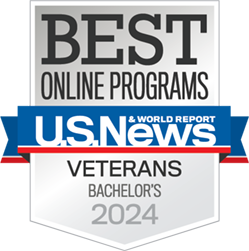
100% Online
48-60 Months*
Accelerate your career with The George Washington University’s (GW) Dual Degree: Bachelor of Science in Health Sciences (BSHS) in Clinical Research Administration/Master of Science in Health Sciences (MSHS) in Leadership and Strategy in Regulatory Affairs and Clinical Research Administration program. Combine the work of earning your BSHS and MSHS and save time on your path to a career in health care.
With the skills you’ll gain in this online dual degree program, you’ll be ready to support clinical research that protects patients through addressing ethical, business and legal considerations and developing regulatory strategies to ensure successful medical product development and approval.
*The total number of credits and duration of the program depend on the number of transferred credits
To learn more about our programs, you can register for our upcoming events.
*Indicates required field
- Read: Privacy Disclaimer Acknowledgment
-
By providing your phone number on this request information form, you have authorized the George Washington University, and its representatives, to send you SMS/Text messages in conjunction with the services you have requested. Message and data rates may apply.
If you no longer wish to receive SMS/Text communications from GW SMHS, you will have the option to opt-out.
By submitting this form, you confirm you have read the Privacy Notice.
Accreditation and Rankings
- GW is accredited by the Middle States Commission on Higher Education
- #62 Best National University*
- #13 Best Online Bachelor's Programs*
- #7 Best Online Programs for Veterans*
* The U.S. News & World Report – 2024 Rankings



Program Highlights
- Fully online, flexible format
- Innovative curriculum and real-world experience
- Transfer 45-60 total credits from a regionally accredited institution into the B.S.H.S. portion of the program
- Nine credits of the M.S.H.S. are completed in the undergraduate portion and charged at the undergraduate per-credit cost
- Specialize your M.S.H.S. by choosing from two concentrations: Regulatory Affairs or Clinical Research Administration
Curriculum: Learn to Ensure Quality and Compliant Clinical Research Conduct, Create Effective Regulatory Strategies and Apply Leadership Skills
In coursework for the dual BSHS in Clinical Research Administration / MSHS in Leadership and Strategy in Regulatory Affairs and Clinical Research Administration you’ll study processes of clinical research, good clinical practices, health equity, bioethics, quality risk management, regulatory strategy, medical product development and registration, and leadership. Due to its rigor, this dual degree program is designed for motivated, high-performing students. This program is ideal for students that would like to take a leadership role in clinical research administration.
By completing the BSHS in Clinical Research Administration, you’ll satisfy 1,500 hours of professional experience towards the 3,000 professional experience hour requirement for the following certifications through the Association of Clinical Research Professionals (ACRP):
- CCRA® (Certified Clinical Research Associate)
- CCRC® (Certified Clinical Research Coordinator)
- CPI® (Certified Principal Investigator)
- ACRP-CP® (ACRP Certified Professional)
You will also satisfy one year of the two-year full-time work experience requirement for the Certified Clinical Research Professional (CCRP®) certification through the Society of Clinical Research Associates (SOCRA).
Why Choose an Online Dual Degree?
By completing nine credits of graduate coursework as part of the BSHS in Clinical Research Administration, you will then be able to complete your MSHS in Leadership and Strategy in Regulatory Affairs and Clinical Research Administration in around four and a half semesters rather than six.
You’ll also save money because students will take nine credit hours of graduate coursework during the undergraduate part of the program that will be charged at the undergraduate tuition rate instead of the graduate tuition rate.
Program Outcomes
Program outcomes for the BSHS in Clinical Research Administration:
- Integrate scientific, medical, regulatory, and commercial requirements to create clinical development plan (CDP) sections that provide for benefit and risk assessments in the development of a new investigational product.
- Analyze strategies to address ethical and cultural considerations for effective and compliant clinical trial conduct in national and international settings.
- Compare clinical, regulatory, and business requirements in the planning and conduct of a clinical trial, including data integrity and documentation.
- Communicate effectively with diverse stakeholders, individually and in group settings, using verbal, written, and electronic modes of communication.
- Explain structural determinants adversely impacting the health of socially disadvantaged groups from diverse perspectives.
Program outcomes for the MSHS in Leadership and Strategy in Regulatory Affairs and Clinical Research Administration:
- Regulations and fundamentals of clinical development: Create clinical and regulatory plans for the development of investigational therapeutics that adhere to domestic and international laws, regulations, and pre- and post-approval requirements.
- Leadership and strategy: Lead interdisciplinary team to develop strategies to ensure successful pharmaceutical/medical device product development, regulatory approvals, and marketing activities.
- Quality and compliance: Formulate strategies to ensure clinical trial diversity, ethical conduct, patient safety, data integrity, and compliance with domestic and international laws and regulations when developing new therapeutics.
- Business acumen: Strategize the therapeutic product lifecycle to address the evolving global legal, clinical, and regulatory requirements in the healthcare industry.
Who Is the Ideal Student for This Program?
This program is designed for anyone interested in joining the thriving clinical research and regulatory affairs industry. If you’re interested in helping advance the regulatory strategy, development, investigation and approval of new medications, products, and therapeutic treatments, this program could be for you. To succeed, you should be self-disciplined, self-directed, and ready to collaborate with faculty and diverse, fellow learners in online formats.
Career Outlook
With the skills gained in our online health sciences dual degree program in clinical research administration and regulatory affairs, you will be ready to enter a variety of jobs throughout the clinical research administration and regulatory affairs fields:
- Regulatory affairs specialist, $73,090 avg. salary1
- Regulatory compliance officer, $60,522 avg. salary2
- Clinical research coordinator, $52,319 avg. salary3
- Clinical research associate, $73,307 avg. salary4
Admission Requirements
To apply for the online dual degree in BSHS in Clinical Research Administration and MSHS in Leadership and Strategy in Regulatory Affairs and Clinical Research Administration, you’ll need:
- Completed application and $80 application fee
- 3.3 GPA or above on a 4.0 scale
- Resume/CV
- Personal statement of 250-500 words that includes reasons for pursuing this degree, any qualifications, accomplishments or honors, and career goals
- Two letters of recommendation from a current/former employer or instructor
- Prerequisite Coursework: Applicants must have completed 45-60 credits of college-level coursework at a regionally accredited institution of higher education. These completed courses should contain the following General Education courses (students who are missing one or two of these courses may be admitted but must complete them at another college or university and transfer them in to GW before they will be able to graduate from GW).
- 6 credits in English composition
- 3 credits in college mathematics (college algebra, statistics, or above)
- 4 credits in natural or physical science with a lab
- 6 credits in social sciences
- 3 credits in humanities
If you have an associate degree from a participating D.C., Maryland, Virginia community college, you may be eligible for guaranteed admission to this program. Review the list of participating institutions or complete this form to speak with an Online Admissions Advisor for more details.
Tuition Details
The online BSHS in Clinical Research Administration/MSHS in Leadership and Strategy in Regulatory Affairs and Clinical Research Administration dual degree at GW consists of 87 credit hours. Please find the cost per credit hour and total estimated program costs here.
Note: Tuition rates are subject to change and additional fees may vary by program.
Meet the Program Directors

GW’s experienced faculty provide you with the rich, practical knowledge and support needed for you to succeed in the program and in your career.
Robin McGarry, MD
- Read Full Bio
-
Dr. McGarry is the Program Director of the MSHS in Leadership and Strategy in Regulatory Affairs and Clinical Research Administration Program. She has taught Clinical Research for Regulatory Affairs in the CRL Regulatory Affairs Program for 3 years. Dr. McGarry is a board-certified internist and nephrologist with over 30 years of experience in the pharmaceutical industry, including over 15 years as a clinical regulatory consultant. She has held positions in both large and small pharmaceutical companies including Immunomedics, Inc., Astellas Pharma, Inc., Pfizer, Inc., Zambon Corp., Ciba-Geigy Corp. (now Novartis), and ICI Pharmaceuticals (now Astra-Zeneca). These positions included senior leadership/functional and line management of global pharmacovigilance organizations, medical affairs and clinical development groups, and matrix management of multidisciplinary groups for product development teams and various special projects. Throughout her career, she has collaborated closely with regulatory affairs groups, contributing to regulatory strategic approaches, based on her experience across various pharmaceutical functions and in-depth knowledge of global health authority regulations and requirements. ;Her teaching experience in the pharmaceutical industry includes developing and conducting workshops and lectures for various clinical development, medical, pharmacovigilance, and regulatory topics. Dr. McGarry holds a B.S. degree in Biology from Georgetown University and an M.D. from UMDNJ-New Jersey Medical School (now Rutgers New Jersey Medical School, Newark, NJ). She completed her internal medicine residency at UMDNJ-University Hospital and Affiliated Hospitals, including Chief Resident in Internal Medicine at the East Orange, NJ Veterans Administration Medical Center and a clinical nephrology fellowship at New England Medical Center, Tufts University School of Medicine, Boston MA.

Kathleen Thoma, EdD, CCRP, CPH
- Read Full Bio
-
Dr. Thoma is the Program Director for the BSHS in Clinical Research Administration Program, the Dual Degree Clinical Research Administration Programs, and the Graduate Certificate in Clinical Research Administration Program. She is also the Assistant Program Director for the MSHS in Leadership and Strategy in Regulatory Affairs and Clinical Research Administration Program, and an Assistant Professor in the Department of Clinical Research and Leadership. She has over 20 years of experience in clinical research, health services research and educational research. Before coming to the George Washington University School of Medicine and Health Sciences, she was the director of research and a clinical research specialist at the University of Florida Center for HIV/AIDS Research, Education and Service (UF CARES) where she managed many NIH and industry-sponsored clinical trials during her tenure. Her particular expertise involved working with NIH-sponsored trials through the International Maternal Pediatric Adolescent AIDS Clinical Trials (IMPAACT) Network and the Pediatric HIV/AIDS Cohort Study (PHACS) network. She has also held positions as research project manager for the Pediatric Research in Office Settings (PROS) Network at the American Academy of Pediatrics, director of educational research at Florida State College at Jacksonville, and research project coordinator at the University of Illinois at Chicago’s College of Medicine/School of Public Health. She earned a doctorate in Educational Leadership with a cognate in Public Health from the University of North Florida. She is a Certified Clinical Research Professional (CCRP) through the Society of Clinical Research Associates (SOCRA) and holds the Certified in Public Health (CPH) credential from the National Board of Public Health Examiners. Her research interests include patient engagement and centricity in clinical trials, increasing diversity and inclusion in clinical trials, health literacy, health disparities and the social determinants of health, health equity, and distance education in the health sciences.
Sources and Disclaimer:
- Payscale.com (2023). Regulatory Affairs Specialist Salary. Retrieved October 10, 2023
- Payscale.com (2023). Regulatory Compliance Officer Salary. Retrieved October 10, 2023
- Payscale.com (2023). Clinical Research Coordinator Salary. Retrieved October 10, 2023
- Payscale.com (2023). Clinical Research Associate Salary. Retrieved October 10, 2023
*The total number of credits and program duration depend on the number of transferred credits.
Curriculum Details
87 total credits required
This multi-level 100% online dual-degree program offers academically qualified individuals a seamless and accelerated pathway for completing both the Bachelor of Science in Health Sciences (BSHS) in Clinical Research Administration and the Master of Science in Health Sciences (MSHS) in Leadership and Strategy in Regulatory Affairs and Clinical Research Administration. Undergraduate and graduate degrees will be conferred sequentially, with the BSHS awarded upon completion of 120 credits (of which 60 credits must be taken at GW; nine of those credits will be graduate level courses that will be taken during the BSHS portion at the undergraduate tuition rate). The MSHS is awarded following completion of an additional 27 credits (9 courses) of graduate coursework.
BSHS Core Courses (17 courses, 51 credits)
- CRA 3101 Basics of Clinical Research (3)
-
The student explores the different phases of drug and device development and introduces basic concepts such as benefit-risk assessment, the different stakeholders, protocol, informed consent, clinical oversight, institutional review board, Good Clinical Practice (GCP), investigational clinical supplies, data management activities, safety reporting, and monitoring.
- CRA 3102 Processes of Clinical Research (3)
-
The student examines the process steps and regulatory requirements governing the development and registration of investigational new products from different stakeholder perspectives as well as the steps and requirements in the conduct of a clinical trial for an investigational new drug or device while ensuring data integrity and human subjects protection.
- CRA 3103 Good Clinical Practices (3)
-
The student analyzes the rationale and goals of Good Clinical Practice (GCP), and applies key principles within the context of case studies.
- CRA 4104 The Business of Clinical Research (3)
-
The student compares and contrasts the business priorities of sponsors, sites and third party vendors, such as contract research organizations (CROs); the student also examines the business considerations in preparing clinical trial budgets including outsourcing and potential trial delays.
- CRA 4107 Introduction to Monitoring Clinical Trials (3)
-
The student analyzes and evaluates the basic principles and processes involved in the monitoring of clinical trials, as well as the required documentation such as monitoring visit reports; the student also examines the role of key participants with emphasis on the clinical research associate.
- CRA 4125 Capstone in Clinical Research Administration (3)
-
In this capstone course, students analyze business, ethical, cultural and practical aspects of clinical trial conduct; explore trends and technologies driving efficiencies in clinical trial performance and demonstrate how ethical and regulatory principles and trial management practices align to ensure quality and compliant clinical research conduct.
- COHM 4110 Strategic Communication for Health Professionals (3)
-
Overview of health communication research, theory, and practice, examining the powerful communication influences on delivering care and health promotion.
- HSCI 2050 Foundations of Health Equity (3)
-
The cross-cutting nature of the social determinants of health and clinical and biomedical implications in practice and research settings. This is the prerequisite course to begin the health equity micro-minor.
- HSCI 2102 Pathophysiology (3)
-
Biomedical and scientific framework for the understanding of human disease mechanisms and biologic processes. Overview of infectious, immunologic, cardiovascular, genetic, respiratory, gastrointestinal, neoplastic, reproductive, renal, hematologic, neurologic, and musculoskeletal diseases.
- HSCI 2105 Current Issues in Bioethics (3)
-
Basic issues, approaches, and requirements of ethically acceptable decision making with patients, including patient confidentiality, conflicts of interest, allocation of scarce resources, occupational risks in health care, and professional responsibility for overall quality of care.
- HSCI 2112W Writing in the Health Sciences (3)
-
Introduction to the health sciences literature Emphasis is on construction, evaluation and organization of written communication of health sciences information.
- HSCI 2117 Introduction to Statistics for Health Science (3)
-
Foundational concepts in descriptive and inferential statistics, including probability, sampling distribution, estimation, correlation, t-Test, simple linear regression, and chi-square. Application of statistical concepts and methods within the health sciences.
- HSCI 3114 Management of Health Science Services (3)
-
Application of management and organizational principles to the delivery of services provided by health sciences disciplines Issues addressed include information systems, leadership, team building, fiscal management, human resources management, quality improvement, and management of conflict and change.
- HSCI 4106 Intro to Epidemiology for Health Sciences (3)
-
An introduction to epidemiological methods and their applications in the prevention and control of illness, community and clinical interventions, and health services.
- HSCI 4112W Research and Writing in Health Sciences (3)
-
Includes a significant engagement in writing as a form of critical inquiry and scholarly expression to satisfy the WID requirement.
- INFR 4101 Introduction to Medical Informatics (3)
-
Medical informatics applications and innovations in health care and the health care system; implications for health care delivery and patient outcomes, including electronic medical records, health system databases, and medical data analysis.
- RAFF 3101 Introduction to Regulatory Affairs (3)
-
Introduction to the field of regulatory affairs to regulations, strategies, and laws that apply to safe and effective product development.
The 3 graduate courses (9 credits) students take in lieu of undergraduate electives are:
- RCR 6201 Introduction to Global Regulatory Affairs and Clinical Research (3)
-
Foundation of regulatory affairs and clinical research in therapeutic development in U.S., EU and Japan. Roles in developing products, navigating the regulatory review and approval process, and maintaining products on the market.
- RCR 6202 Regulatory Strategy in the Development of Therapeutics (3)
-
Overview of therapeutic development through the analyses of the critical elements of the product lifecycle, assessment of non-clinical and clinical data, and integration of strategic business needs and post-marketing efforts in planning regulatory strategy. Prerequisite: RCR 6201.
- COHM 6235 Leadership Development in Healthcare Systems (3)
-
Overview of principles related to leadership, including theories and styles, organizational management and values, communication strategies, and change in the context of healthcare systems.
MSHS Core Courses
- RCR 6206 International Regulatory Affairs and Clinical Research (3)
-
This course explores international regulatory requirements for the development and approval of new pharmaceutical products around the world. Prerequisite: RCR 6201.
- HSCI 6264 Epidemiology (3)
-
Students explore the basic concepts of epidemiology which includes various epidemiological study designs used to examine disease frequency, cause-effect relationships between risk factors and disease states, and effects of bias as examples. Students apply epidemiologic concepts in the context of translational research.
- COHM 6245 Strategic and Operational Decision Making for Health Care Leaders (3)
-
Overview of business principles related to health care systems and leadership, focusing on strategic management of health care service delivery in various settings. Credit cannot be earned for this course and HSCI 6241.
In addition to the above 3 core courses, take 1 of the following core courses based on concentration:
- RAFF 6275 Leadership in Regulatory Affairs (3)
-
Theories of leadership and change are integrated in the development of change proposals for the regulatory affairs field. The development of leadership solutions to problems in leading regulatory strategic change; integration of all field coursework into implementation plans for health care system changes.
- CRA 6275 Leadership and Change in Clinical Research Administration (3)
-
A capstone course focusing on the concept of leadership within the contexts of health professionals, health systems, and health policy.
Regulatory Affairs (RAFF) Concentration (4 Courses; 12 Credits)
- RAFF 6203 Regulatory Strategy in the Development of Devices and Diagnostics (3)
-
Development and evaluation of the regulatory affairs strategies that support device and diagnostics development. Research science, study design, master file, risk/benefit analyses, product specifications and milestone identification, IDE, 510K, PMA. Prerequisites: RCR 6201.
- RAFF 6204 Clinical Research for Regulatory Affairs (3)
-
The planning and conduct of clinical trials. Topics include protocol development, study design, post-marketing surveillance, and evaluation and assessment of regulatory submissions. Strategies for achieving clinical development goals. Prerequisite: RCR 6201.
- RAFF 6205 Regulatory Affairs Compliance (3)
-
Analysis and evaluation of regulatory affairs compliance strategies and guidelines. Pre and post marketing compliance of medical products, oversight, labeling, advertising and use. Prerequisite: RCR 6201.
- RAFF 6207 Advertising and Promotion of Regulated Medical Products (3)
-
Exploration of FDA-regulated advertising and promotion of pharmaceutical drugs. Focus on pre- and post-market issues for prescription drugs and management of risks and compliance surrounding medical and commercial communications. Prerequisites: RCR 6201 and RCR 6202.
Regulatory Affairs (RAFF) Concentration Electives
(Select 1 course; 3 credits)
- HSCI 6263 Biostatistics for Clinical and Translational Research (3)
-
Basic concepts and methods of biostatistics applied to translational research. Topics include distributions, populations and sample selection, variables, interaction and confounding, hypothesis formulation, correlation, t-tests, ANOVA, regression, and chi.
- CRA 6203 Partnerships with Human Subjects (3)
-
This course explores regulatory, policy, ethical and practical considerations associated with the engagement, recruitment, retention and interaction with human research subjects.
- CRA 6209 Quality and Risk Management (3)
-
This course explores how to manage risk and safety assessments to ensure quality in clinical research.
- CRA 6211 Monitoring, Auditing and Oversight in Clinical Research (3)
-
Key stakeholder roles, responsibilities, and processes associated with monitoring, auditing, and oversight in clinical trial conduct.
Clinical Research Administration (CRA) Concentration (4 Courses; 12 Credits)
- CRA 6203 Partnerships with Human Subjects (3)
-
This course explores regulatory, policy, ethical and practical considerations associated with the engagement, recruitment, retention and interaction with human research subjects.
- CRA 6204 The Clinical Research Industry (3)
-
Integration of project management principles, decision making models, cross-cultural competency, and interdisciplinary team dynamics to facilitate effective and efficient conduct of clinical trials.
- CRA 6209 Quality and Risk Management (3)
-
This course explores how to manage risk and safety assessments to ensure quality in clinical research.
- CRA 6211 Monitoring, Auditing and Oversight in Clinical Research (3)
-
Key stakeholder roles, responsibilities, and processes associated with monitoring, auditing, and oversight in clinical trial conduct.
Clinical Research Administration (CRA) Concentration Electives (Select 1 course; 3 credits)
- HCQ 6201 Building a Quality Culture (3)
-
Application of leadership and organizational change theories and principles to the implementation of quality and patient safety initiatives. Focus on strategies for developing the culture and infrastructure needed to support patient safety and continuous quality improvement.
- HSCI 6263 Biostatistics for Clinical and Translational Research (3)
-
Basic concepts and methods of biostatistics applied to translational research. Topics include distributions, populations and sample selection, variables, interaction and confounding, hypothesis formulation, correlation, t-tests, ANOVA, regression, and chi.
- RAFF 6204 Clinical Research for Regulatory Affairs (3)
-
The planning and conduct of clinical trials. Topics include protocol development, study design, post-marketing surveillance, and evaluation and assessment of regulatory submissions. Strategies for achieving clinical development goals. Prerequisite: RCR 6201.
- RAFF 6205 Regulatory Affairs Compliance (3)
-
Analysis and evaluation of regulatory affairs compliance strategies and guidelines. Pre and post marketing compliance of medical products, oversight, labeling, advertising and use. Prerequisite: RCR 6201.
- RAFF 6207 Advertising and Promotion of Regulated Medical Products (3)
-
Exploration of FDA-regulated advertising and promotion of pharmaceutical drugs. Focus on pre- and post-market issues for prescription drugs and management of risks and compliance surrounding medical and commercial communications. Prerequisites: RCR 6201 and RCR 6202.
Key Dates
|
Summer 2024 |
Fall 2024 |
Spring 2025 |
|
| Application Deadline |
March 20, 2024 (Closed) |
July 20, 2024 (Open) |
December 1, 2024 (Open) |
Admissions Requirements
To apply for the dual degree in BSHS in Clinical Research Administration and MSHS in Leadership and Strategy in Regulatory Affairs and Clinical Research Administration (100% online), you’ll need:
| Completed application and $80 application fee |
| 3.3 GPA or above on a 4.0 scale |
| Resume/CV |
| Personal statement of 250-500 words that includes reasons for pursuing this degree, any qualifications, accomplishments or honors, and career goals |
| Two letters of recommendation from a current/former employer or instructor |
| Official transcripts from every college and university attended. All non-U.S. transcripts (including those in English) must be evaluated by an accredited foreign credential agency. Review the list of member organizations |
|
Prerequisite Coursework: Applicants must have completed 45-60 credits of college-level coursework at a regionally accredited institution of higher education. These completed courses should contain the following General Education courses (students who are missing one or two of these courses may be admitted but must complete them at another college or university and transfer them in to GW before they will be able to graduate from GW).
|
NOTE: This program is authorized, exempt, or not subject to state regulatory compliance and may enroll students from all 50 states, U.S. territories and the District of Columbia.
International Students
International students should check with individual programs regarding eligibility for visa sponsorship. Generally, online and hybrid programs are not eligible for student visa sponsorship from GW. This would include transfer students from any other institution with an existing visa.
Official transcripts from institutions outside the U.S. must be accompanied by an official transcript evaluation from an accredited independent evaluating agency. Please be sure you request a detailed evaluation that includes all course titles, credit hours, grades, U.S. degree equivalency, grade-point averages (GPA), and date of degree conferral. For a list of acceptable foreign credential evaluation services, please visit NACES.
Applicants who are not U.S. citizens are also required to submit official test scores for the Test of English as a Foreign Language (TOEFL) or Pearson’s Test of English (PTE) Academics or the academic International English Language Test System (IELTS). To be considered for admission, there are required scores that you will need to meet. Score requirements may differ by school and program so check the admissions requirements for your program.
Supporting Documents and Official Transcript
Documents and Official Transcripts not submitted online should be mailed to:
Mail: George Washington University
ATTN: Transcript Processing Center
1415 W 22nd St.
Suite 220
Oak Brook, IL 60523
Alternatively, official electronic transcripts can be sent to: transcripts@hsprograms.gwu.edu